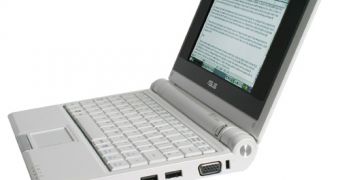The tiny ultra-mobile computer from Asustek looks more of a toy than of a notebook computer, but this is no surprise, since the main targets of the sub-notebook are children. However, the "pseudo-computer" has hijacked the whole industry and set a new trend on the mobile computing market.
The Eee PC had millions of units sold by now and industry giants start to worry about it's explosive popularity. The notebook industry's David managed to ruin the plans of large conglomerates such as Sony. "If (the Eee PC from) Asus starts to do well, we are all in trouble. That's just a race to the bottom," said Mike Abary, senior vice president of Sony's IT product division. According to him, the inexpensive notebook could shift the entire notebook industry.
The things look pretty straightforward: if average computer users figure out that they don't need ultra-expensive systems to perform their daily tasks, they will quit buying new computers or upgrading to the latest configurations, which would harm the computer sales. For instance, why buy a miniature yet powerful Sony Vaio when you can do great with your $299 Asustek Eee PC?
Abary seems to agree with the sub-notebook's popularity among Linux developers and some of the device's early adopters. "But if mainstream buyers buy it, then, whoa," he continued. Mainstream notebook vendors should have all the reasons to fear. You may remember the fact that the Eee PC now ships in both Linux and Windows XP flavors, and numerous reports claim that the mini-notebook can flawlessly run stripped-down versions of Windows Vista.
Sony's lowest price for a mainstream computer is situated in the $800 range, and the company starts to be cornered by more and more PC vendors who got their own ultra-low cost mobile computers, such as Lenovo, Acer, Everex. Most importantly, HP has been reported to secretly cook its own dish of ultra-mobile PC, the Compaq 2133. All these devices have been inspired by Asustek's Eee PC.
Of course, the high-end laptop sales are not influenced by the explosive popularity of cheap UMPCs. The high-end customers are looking for pure computing performance and the latest features on the market, a combination that is (and will be) beyond the powers of a $299 notebook.

 14 DAY TRIAL //
14 DAY TRIAL //